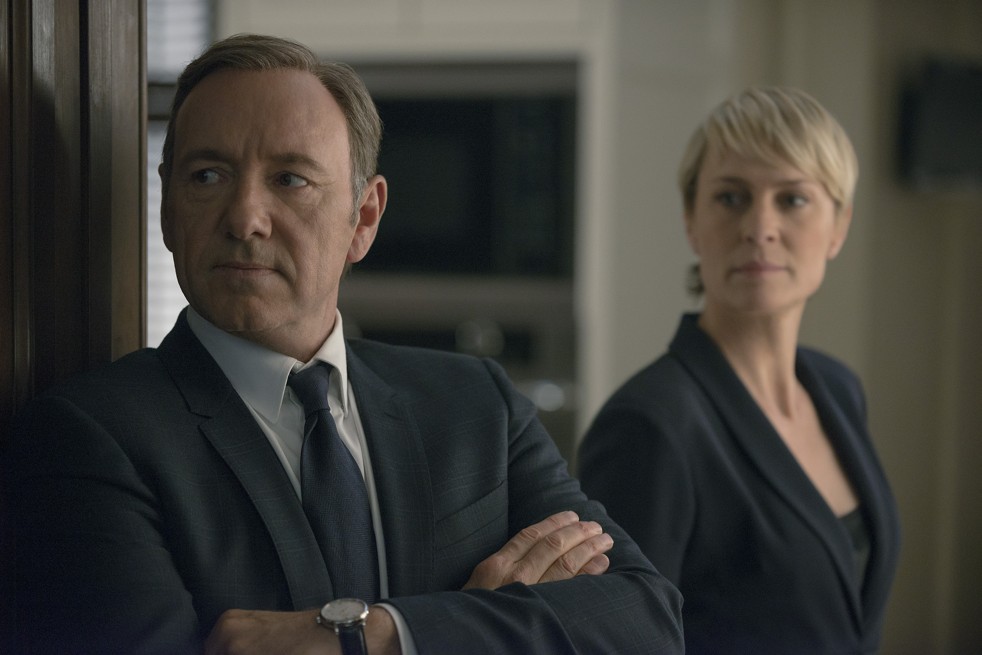New Season of “House of Cards” Does Not Disappoint
Netflix’s “House of Cards” was a revolutionary new step for TV in 2012 when the entire first season was released on one day. The DVD delivery service turned streaming giant turned hopeful television takeover website has continued its Emmy and Golden Globe winning political drama with a second season, ramping up the action, and pleasing every binge-watching TV addict who was looking for a new set of episodes to happily drain away 13 hours.
Season two was released on Feb. 14, 2013: Valentine’s Day. That meant that I, like many other Netflix subscribers, did not leave my room, and instead booked a date with my computer and a tub of birthday cake ice cream that had my name on it.
The new season picks up immediately after season one left off. Frank Underwood, played excellently by Kevin Spacey, and his wife, Claire, played with steely resolve by Robin Wright, are just finishing up that midnight run they started last year. This first episode starts off with a slow fade in, and waits for the couple to jog up to the camera. The show deceptively reels its audience back in slowly, but by the end of just the first episode, whoever is holding that rod has yanked as hard as possible, pulling that same audience out of the water and depriving it of oxygen just to watch the thing flop around on the deck. Still, despite the masochism that the show’s writers seem to enjoy inflicting upon the audience, the bait that they put on the hook is too enticing to ignore.
Spacey and Wright shine as the most ruthless power couple in America. As Frank Underwood takes over the vice president office and attempts to bring down the president, his “friend” and adversary, Spacey gleefully demonstrates Underwood’s two-faced nature, swinging from emotion to conflicting emotion. The Machiavellian machinations of Frank Underwood roll together throughout the 13-episode season, and Spacey makes it fun to watch even if it is sometimes hard to keep up with all of the politics. Still, the character never quite moves forward in his development. Frank is still a strong and undeniably sociopathic character, but apart from one or two episodes, the man doesn’t seem to have changed or revealed much more information about himself this season. Wright’s Claire Underwood is right along Frank’s side in her scheming and manipulation, sometimes frighteningly so, as seen in the first episode of the season when she unflinchingly tells a pregnant woman “I’m willing to let your child whither and die inside you if that’s what’s required. Now tell me, am I really the sort of enemy you want to make?” Wright is given so much more to work with this season, and she does not disappoint.
Season one saw the loss of one of the show’s best characters, Peter Russo, played by Corey Stoll, but season two takes some of its focus to some surprising returning minor characters, as well as the cold, conniving, yet not so morally corrupt female version of Frank Underwood, Molly Parker’s Jackie Sharp. The writers use characters like Remy Danton, Raymond Tusk, and Lucas Goodwin to help carry the plot along with familiar faces. This strategy of employing minor characters in more major roles pays off well, letting the action happen without necessary character establishment groundwork.
Although characters like Tusk and Danton seem to be more like plot devices in this season, Goodwin’s season two arc is a spiritual successor to the arc of Peter Russo in season one. He provides an actual emotional connection in the show as everyone around him is stabbing each other in the back while smiling at press conferences. It’s a pity the writers never take Goodwin to as dark a road as they took Russo, because there is so much potential for the broken character.
In all, “House of Cards” is still a show that continues to deliver, both because of its spectacular cast and the addictive plot line that, being available all at once, is the television equivalent of a page-turner. It is fascinating to see the inner workings of this fictional government, but a bit frightening simply because it seems all too realistic.



